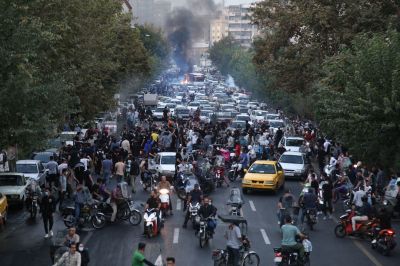What Iran’s election means for the future of religious freedom

When Iran elects a new leader to take over for President Ebrahim Raisi on June 28, the world will watch to see if the country finally turns a corner towards embracing religious freedom, or if it continues its dark path of persecuting all faiths outside of Shia Islam.
Raisi had a notorious legacy of overseeing violence and oppression in his country. In the 1980s he was part of a death commission that executed thousands of political opponents imprisoned without due process. As a religious hardliner, Raisi supported gender segregation, the Islamization of universities, and the censorship of Western culture. He was widely expected to succeed Ayatollah Ali Khamenei as Supreme Leader of Iran.
With Raisi now gone, there is a window of possibility — however small — that the next president could steer Iran away from its oppressive past. The election could be the most consequential political step in decades for Iran, leading to sweeping changes for religious freedom.
Iran’s record on human and religious rights is appalling. The US Commission on International Religious Freedom (USCIRF) has documented systemic harassment, arrests, assaults, and torture of protestors, including minors. The enforcement of the hijab law has intensified, showcasing the regime’s iron grip on personal freedoms.
Apostasy remains a capital offense and converts to Christianity or other minority faiths are often forced to worship in secret. Public worship can lead to arrest, imprisonment, and even death. The dwindling Christian population, now less than 100,000 among 80 million Muslims, faces relentless persecution. Even Armenian and Assyrian churches, though tolerated, are shackled by restrictions that aim to suffocate their communities.
The upcoming election is not just a political event; it is a litmus test for the future of religious freedom in Iran. If a hardline candidate triumphs, we can expect the status quo to persist, or worsen. The conservative faction's stranglehold on power suggests a continuation, if not an escalation, of religious persecution. The regime's survival depends on its ability to control and suppress dissent, and religious minorities are convenient scapegoats.
Conversely, a victory for a moderate or reformist candidate could herald a slow but meaningful shift towards greater religious tolerance. While the Supreme Leader and entrenched conservative institutions limit the potential for radical change, a reformist president might ease the enforcement of religious laws, protect religious minorities, and foster a culture of dialogue and tolerance. This could provide a respite for Christians and other minorities, reducing the daily threats they face.
International dynamics will also play a crucial role. Should Iran seek to improve relations with the West, we might see a loosening of religious restrictions as a gesture of goodwill. However, an isolationist stance will likely embolden hardliners to tighten their grip, using religious persecution as a tool of internal control.
The Iranian people's spirit of resistance, seen in the 2022 protests following Mahsa Amini's death, remains a beacon of hope. A renewed grassroots movement advocating for personal freedoms could pressure the government to reconsider its stance on religious freedom. Yet, the regime has proven itself willing to employ lethal force against its own citizens.
This election is a pivotal moment for Iran’s future. It offers a glimmer of hope that the nation might move towards greater religious freedom and better treatment of minorities. We can only hope and pray that the outcome ushers in a new era where Christians and others can worship freely, marking a significant departure from decades of oppression.
Dr. David Curry is President and CEO of Global Christian Relief (GCR), America’s leading watchdog organization focused on the plight of persecuted Christians worldwide. In addition to equipping the Western church to advocate and pray for the persecuted, GCR works in the most restrictive countries to protect and encourage Christians threatened by faith-based discrimination and violence.




























